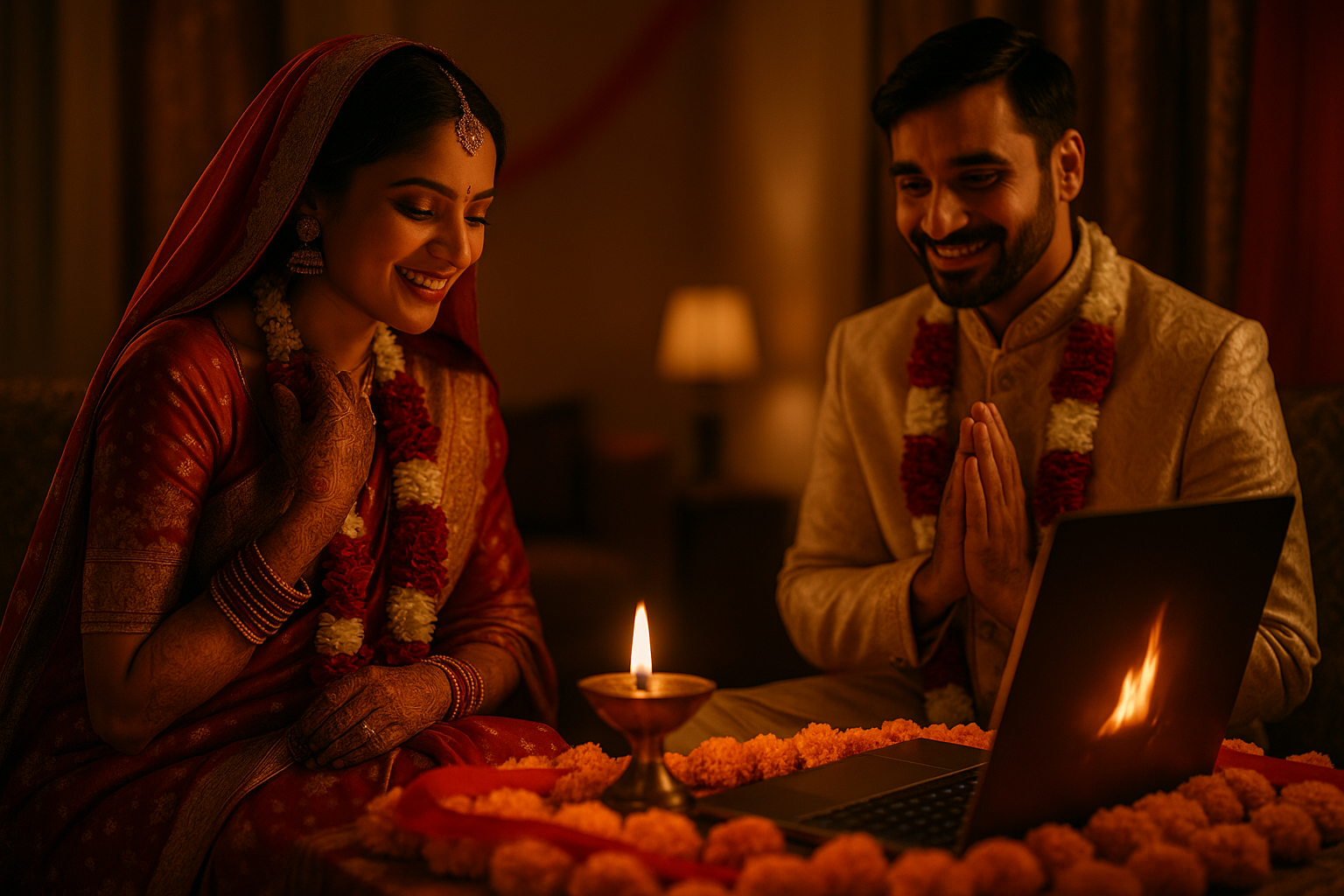In today’s interconnected world, couples are increasingly turning to virtual marriage ceremonies to celebrate their unions. For those wishing to honor Hindu traditions, it’s entirely possible to incorporate these rich rituals into an online wedding. Let’s explore how key Hindu wedding customs can be adapted for a virtual setting.
Understanding the Essence of Hindu Wedding Rituals
Hindu weddings are steeped in rituals that symbolize the union of two souls and their families. Central to these ceremonies are customs like the Saptapadi (seven steps), Mangalasutra (sacred necklace), and the sacred fire ritual. Adapting these traditions to a virtual format requires creativity and a deep understanding of their significance.
Adapting the Saptapadi Virtually
The Saptapadi, or seven steps, is a pivotal ritual where the couple takes seven steps together, each representing a vow. In a virtual ceremony, couples can recite these vows while walking around a symbolic representation of the sacred fire in their respective locations, ensuring the essence of the ritual is preserved.
Incorporating the Mangalasutra Ceremony Online
The tying of the Mangalasutra signifies the marital bond. During a virtual wedding, the groom can present the necklace to the bride, who then places it around her neck, symbolizing their union. This act can be coordinated over a video call, maintaining the ritual’s sanctity.
Conducting the Sacred Fire Ritual Remotely
The sacred fire, or Agni, is a witness to the marriage vows. Couples can light individual lamps or candles in their respective locations, symbolizing the presence of Agni. This adaptation allows the couple to honor the tradition while being physically apart.
Virtual Exchange of Garlands
The exchange of garlands, known as Mala Badal, signifies mutual acceptance. In a virtual setting, couples can prepare garlands and simultaneously place them over their own shoulders during the ceremony, symbolizing the exchange.
Ensuring Legal Recognition of Virtual Hindu Marriages
While incorporating these traditions is meaningful, it’s crucial to ensure that the virtual marriage is legally recognized. Couples should consult with legal experts or services specializing in online marriages to navigate the legalities effectively. For more information on legal aspects, visit our Immigration Support page.
Planning Your Virtual Hindu Wedding
Planning a virtual wedding requires attention to detail. From coordinating with a priest who can officiate online to ensuring all participants have the necessary technology, every aspect should be meticulously planned. Our How It Works page offers guidance on organizing virtual ceremonies.
Documenting Your Virtual Ceremony
After the ceremony, obtaining a marriage certificate is essential. Ensure that the virtual ceremony meets all legal requirements for documentation. Our Apostille Service can assist in authenticating your marriage documents for international use.
Embracing Technology for Traditional Rituals
Technology offers innovative ways to honor traditions. Utilizing video conferencing platforms, digital invitations, and online streaming can help involve family and friends, making the virtual ceremony as engaging and heartfelt as a traditional one.
Overcoming Challenges in Virtual Hindu Weddings
While virtual weddings offer flexibility, they come with challenges such as coordinating across time zones and ensuring internet stability. Planning ahead and having contingency plans can help mitigate these issues, ensuring a smooth ceremony.
Celebrating Your Union Beyond the Virtual Ceremony
After the virtual ceremony, consider hosting a small in-person gathering when possible to celebrate with loved ones. This allows for the sharing of joy and the continuation of traditional post-wedding rituals.
FAQs
Can a virtual Hindu wedding be legally recognized?
Yes, virtual weddings can be legally recognized, but it’s essential to consult with legal experts to ensure all requirements are met.
How can we involve family members in a virtual ceremony?
Family members can participate by performing readings, blessings, or even coordinating rituals from their locations, ensuring they feel included.
What technology is needed for a virtual wedding?
A reliable internet connection, a video conferencing platform, and devices with cameras and microphones are essential for a virtual wedding.
How do we handle rituals that require physical presence?
Adaptations can be made, such as performing rituals simultaneously in different locations or using symbolic representations.
Can we have a priest officiate the ceremony virtually?
Yes, many priests are now offering virtual officiation services. It’s important to coordinate with them in advance to plan the ceremony.
Embracing Hindu traditions in a virtual marriage ceremony is a beautiful way to honor your heritage while adapting to modern circumstances. With careful planning and creativity, your virtual wedding can be as meaningful and memorable as a traditional one. For assistance in planning your virtual Hindu wedding, feel free to contact us.




